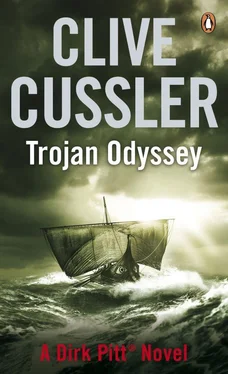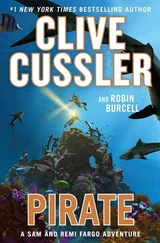Perlmutter grinned broadly. Boyd and Chisholm were affirming what he had always believed. "What no one considered until Wilkens was that, instead of being Greek, Homer was a Celtic poet who wrote about a legendary battle that occurred four hundred years earlier, not in the Mediterranean but in the North Sea."
Gunn looked adrift. "Then the epic voyage of Odysseus…"
"Took place in the Atlantic Ocean."
Summer's mind was spinning. "Are you implying that Helen's face didn't launch a thousand ships?"
"What I was about to suggest," Boyd countered with a tired smile, "is that the truth behind the myth was not about a conflict fought because of a king's rage for revenge over the abduction of his wife by her lover. Hardly an excuse for thousands of men to fight and die for a promiscuous woman, is it? Wise old Priam, the king of Troy, would never have risked his kingdom nor the lives of his people merely to allow a wayward son to live with a woman, who, if the truth were known, willingly left her husband for another man. Nor was it a quest for the treasures of Troy. Rather, realistically, the conflict was fought over a soft crystalline metallic element called tin."
"St. Julien gave Summer and me a lecture about how the Celts ushered in the Bronze and Iron Ages," said Dirk, looking up from diligently taking notes.
Chisholm nodded in agreement. "To be sure, they launched the industry, but no one can say with any degree of certainty who actually discovered that mixing ten percent tin with ninety percent copper forged a metal twice as hard as anything known before. Even the exact dating is hazy. The best guess is that it appeared around two thousand B.C."
"Smelting copper was known as far back as five thousand B.C. in central Turkey," said Boyd. "Copper was in abundance throughout the ancient world. Mining took place on a grand scale in Europe and the Middle East. But when bronze came along, there was a problem. Tin ore is rare in nature. Like later gold rushes, prospectors and traders spread throughout the ancient world in search of the ore. They eventually found the largest deposits in Southwest England. The British Celtic tribes quickly cashed in and built an international marketplace for dealing in tin that they mined, smelted into bars and traded throughout the ancient world."
"Due to the high demand, the ancient Brits quickly developed a monopoly and commanded high prices from foreign traders," added Chisholm. "Though traders from rich empires such as Egypt could afford to trade in expensive goods, the Celts of Central Europe had only handmade objects and an abundant supply of amber to offer. Without a bronze industry, they had little hope of going beyond an agricultural society."
"So they decided to band together and seize the tin mines from the Brits," Yaeger anticipated.
"Precisely," Boyd replied. "The Celtic tribes on the continent formed an alliance to invade southern England and seize the mines in a territory then known as the Troad, or later Troy. The capital city was called Ilium."
"So the Achaeans were not Greeks," said Perlmutter.
Boyd gave a slight nod of his head. "Achaean was a loose term for allies. The Trojans generally referred to themselves as Dardanians. Just as Egypt was not the title for the Land of the Pharaohs."
"Hold on," said Gunn. "Then where did the name Egypt come from?".
"Before Homer, it was known as Al-Khem, Misr or Kemi. Not until hundreds of years later, when the Greek historian Herodotus gazed upon the pyramids and the temple of Luxor, did he call the fading empire Egypt, from a land described in Homer's Iliad. From then on, the name stuck."
"What evidence does Wilkens give for his theory?" asked Sandecker.
Boyd looked expectantly at Chisholm. "Do you want to take the ball, Doctor?"
"You probably know as much about it as I do," Chisholm said, with a pleased smile.
"May I jump in?" asked Perlmutter. "I've studied Wilkens's book Where Troy Once Stood."
"Be our guest," Boyd acquiesced.
"There is a mountain of evidence," Perlmutter began. "For one thing, almost nothing that Homer described in his epic works stands up to scrutiny. Nowhere does he call the invading fleet 'Greeks.' During eleven hundred B.C., when the war supposedly took place, Greece was sparsely populated. There were no major cities that could support a large fleet of fighting ships and crews. The early Greeks were not considered seafaring people. Homer's reports of the ships and the men who rowed them across the sea seems better suited to the Vikings two thousand years later. Also, his descriptions of the sea more closely match the Atlantic European coastline than the Mediterranean.
"Nor do his climate narratives jibe. Homer recounts heavy, constant rain, thick mists or fog and sleet. Weather conditions more common for England than southern Turkey, which is just across the Med from the Sahara Desert."
"And there is the vegetation," Boyd prompted.
"To be sure," Perlmutter said with a modest nod. "Most all the trees Homer details are better suited to the damper atmospheres of Europe than the more arid land of Greece and Turkey. He talks mostly of deciduous green-leafed trees, while Greeks would be more familiar with evergreen conifers. And then we have horses. The Celts were a horse-loving people. The use of horses by ancient Greeks in battle was unheard of. The Egyptians and the Celts used chariots as fighting platforms, but not the Greeks or Romans. They preferred to fight on foot, using chariots only for transport and races."
"Any differences on the subject of food?" inquired Gunn.
"Homer mentions eels and oysters. Eels start from their breeding ground in the Sargasso Sea and migrate to the cold waters around Europe. He used the term diving for oysters, which are far more prevalent in the oceans outside the Mediterranean. If a Greek dove, it would have been for sponges, which were common in Greece at the time."
"What about the gods?" Sandecker put forth. "The Iliad and Odyssey are filled with the interference of the gods on both the Trojan and Greek armies."
"The Celts were there first. Classical scholars have concluded that the gods Homer portrayed were originally Celtic and inherited from Homer's works by later Greeks." Perlmutter paused and then added: "Another interesting point. Homer stated the Greeks and Trojans cremated their dead. This was a custom of the Celts. People around the Mediterranean generally interred their deceased."
"Intriguing hypothesis," said an unconvinced Sandecker. "But conjecture just the same."
"I was coming to the best part." Perlmutter showed his teeth in a wide smile. "Wilkens's most extraordinary revelations prove convincingly that the cities, islands and nations that Homer wrote about in his epic poems either did not exist or were called something completely different. The geography and the topography in the Iliad simply do not match with the existing land and seascapes around the Mediterranean. Wilkens discovered that Homer's names for towns, regions and rivers have their source in continental Europe and England. The Greek names do not fit the neighborhood of both Troy and the kingdoms of the Greek heroes, nor do the descriptions of settings match geophysical reality."
"The list goes on," said Chisholm. "Homer describes Menelaus with red hair, Odysseus with reddish brown and Achilles as blond. Also, some warriors were depicted with fair skin. None of these are characteristic of Mediterranean people. It's almost as if they came from another time and dimension."
"The invading Achaean tribes came from the bronze-making regions of France, Sweden, Denmark, Spain, Norway, Holland, Germany and Austria. Their fleet probably assembled at what is now Cherbourg and sailed across the Sea of Helle, which gave its name to the Hellespont in Turkey and is now known as the North Sea. They landed in a large bay once called the Thracian Sea, which is now labeled on present-day maps simply as the Wash in Cambridgeshire. The waters touched the shores of the East Anglian plain."
Читать дальше












